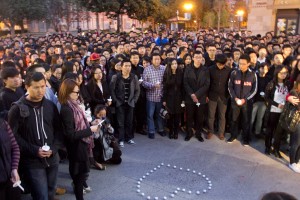Backpacking in China led to Dube’s study of Chinese
When Clayton Dube, executive director of the USC US-China Institute, took his first trip to China in 1982, he expected to spend a month backpacking around the country before returning home to California. Instead, he got a job and stayed for three years.

Support · Clayton Dube, executive director of the USC US-China Institute, spoke at the vigil for graduate students Ying Wu and Ming Qu. - Carlo Acenas | Daily Trojan
“When I went to China in 1982, I had not really studied China very much,” Dube said. “Upon going to China, I found myself completely fascinated by the country, by the culture, by the people and wanted to know more.”
He spent two years teaching English and American studies at the Central Institute of Financial Banking and a third year at the Beijing Broadcasting Institute.
“When I came back to the United States in 1985, I thought I was mostly done with China, but I wasn’t,” Dube said. “The lure remained strong.”
Dube had finished his undergraduate degree when he traveled to China but decided to return to school to study Chinese history, with an emphasis in modern economics. He taught at Berea College in Kentucky before going to UCLA, where he began the work that would eventually lead him to his position as executive director of the USC US-China Institute.
“UCLA and USC cooperate on almost nothing, but we absolutely have a long history of cooperating on East Asia,” Dube said. “We have a joint East Asia center. I managed the UCLA side of that so, as a consequence, I had close ties with people here and was always impressed that USC had a lot of strength on contemporary China.”
He said he was offered the job when the institute opened in 2002, aiming to examine US-China relations from a wide variety of angles, to train students to study these relations and to enhance and improve inter-country relations. Dube also oversees production of US-China Today, Asian Pacific Arts and a variety of programs that take students and teachers to tour China.
“Last year, about 11 programs took USC students to China and exposed them to different things,” Dube said. “Their lives will be richer for the experience. China has a rich history and distinctive culture, and in understanding something about someone else, you really come to understand yourself more. You’ll find out what you truly care about, what you value, what really matters to you.”
Two weeks ago, Dube and the institute stepped in to assist the university after the fatal shootings of Chinese graduate students Ying Wu and Ming Qu on April 11. Dube said they worked with the Office of Student Affairs, the Office for International Services and the community to notify their parents, organize the memorial service and facilitate conversation between the students’ parents and Viterbi School of Engineering faculty and students.
“This took a little bit of all of us, and it’s by coming together that we nourish each other and help each other through this,” he said. “We did all and are still doing all that we can, but that’s not just true here, that’s true across the campus.”
Dube also spoke in Chinese at the candlelight vigil the night of the shooting.
“So many people came together with no notice,” he said. “I just tried to share what was in my heart.”
